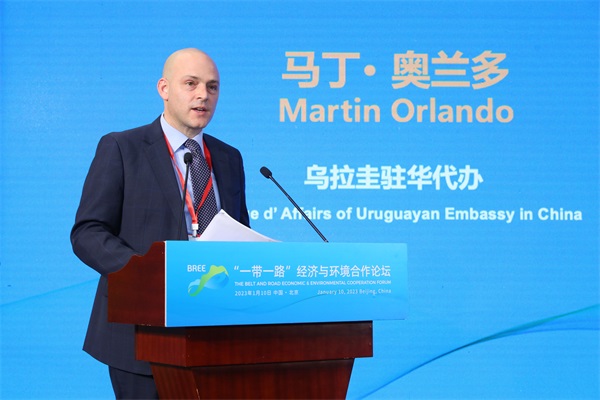Martin Orlando: Uruguays Green Development Process and Cooperation Prospect
This year marks the 35th anniversary of the establishment of diplomatic relations between China and Uruguay and coincides with the 10 anniversary of the launching of the Initiative of the Belt and Road by President Xi Jinping. In this item it is worth remembering that Uruguay was the first country of Mercosur to adhere to the initiative in the year 2018. Since that moment we have seen the Initiative expanding to include a broad rank of issues that are shared among its members as well as an amazing expansion in its membership.
This particular Forum is more relevant now than ever before.
Allow me to acknowledge the successful celebration of the XX Congress of the Communist Party of China and its decision to continue to prioritise the environmental agenda, not only for China but for a world with a shared future. This Forum is ideal to develop exchanges and cooperation on green development, measures against contamination and the revitalisation of ecosystems, including issues of biodiversity.

Martin Orlando, Charge d' Affairs of Uruguayan Embassy in China
In this spirit I would like to share with all the participants the advances of my country, Uruguay, on environmental issues, and emphasise that Uruguay is ready to cooperate in all of these with all interested parties.
I will focus this brief presentation on the issue of renewable energies as one of the main achievements in Uruguay in recent years. As many of you may know, Uruguay has become the second country in the world in terms of electricity production from renewable sources. Currently, electrification covers 99,8% of households countrywide. To the traditional hydropower generation the country has added important capacities in wind and solar power production and, also biomass which is also an important part of a soon to be launched national policy on bio economy. Only 5% of the production of electricity between 2016 and 2021 depended on fossil fuels.
Our electricity systems stands out for its reliability. According to the Global Competitiveness Index, Uruguay ranks first in Latin America in terms of the quality of electricity supply and the state owned company in charge of electricity distribution has received for the second time in 2021 the Gold Award granted by the Regional Energy Integration Commission out of 32 countries. Currently Uruguay is exporting electricity to its two big neighbours: Argentina and Brazil.
After reaching this goal, Uruguay is implementing the second stage of its energy transition towards becoming a CO2 neutral country. This involves decarbonising the rest of the energy sector which will affect industry and transport.
Currently, the transportation sector is the main consumer of oil derivatives in Uruguay and the second largest consumer or energy after the industrial sector. Electric mobility means reducing polluting gas emissions but also noise pollution and advancing in energy sovereignty for a non oil producing country. The objective is to electrify urban public transport, company fleets and applications as well as to promote electrification among private vehicle owners. An aspect in which we can see China is quite advanced. We are very happy to see that some Chinese companies are already cooperating with many local authorities in Uruguay in order to provide vehicles and services for the successful implementation of this second stage.
Uruguay has also embarked in the development of a green hydrogen economy. For this last aspect we are replicating the model of the change in electricity generation by opening the market to a strong private participation in investment. The production of green hydrogen will be used in applications that include a variety of items such as the synthesis of ammonia for fertilisers, the production of fuel for mobility in heavy vehicles and hydrogen derivatives for maritime and aviation use, the production of heat in some climatic conditions, the thermal condition of buildings and the direct reduction of iron for steel production.
The natural conditions of Uruguay added to the existing capacity for the production of clean electricity positions our country in the best possible conditions to develop this new green fuel. The Embassy of Uruguay in China has disseminated information about the different stages of the programme of development of Green Hydrogen and we remain available to all interested parties to contact us to further develop this area of cooperation.
The implementation of the project called "H2U" will require important new investments in infrastructure the country such as transmission networks, gas ducts, and some port infrastructure.
Also there is still some scientific research that must be done as well as capacity building of the work force. However, Uruguay is well embarked in this project and advancing day by day.
A forum such as this presents an ideal opportunity, for which I thank again the organisers, to promote the advances of Uruguay in environmental issues but also our way of looking at the future: with hope that it will be better and cleaner, and that we can only get there through cooperation and exchanges for which we remain ready.
 Scan and Follow Us
Scan and Follow Us

